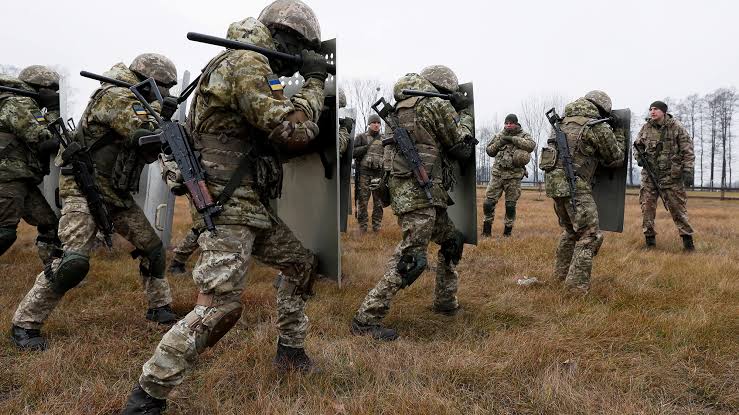As war on Ukraine drags on, divide between advanced, developing nations widens

Less than a month before Russia commenced its full-scale invasion of Ukraine last year, Kenyan Ambassador to the United Nations Martin Kimani sounded an alarm over growing tensions in Ukraine during an emergency meeting of the U.N. Security Council, referring to African words of wisdom.
The proverb he cited, “When two elephants fight, it is the grass that suffers,” describes the sorrow of the vulnerable.
One year on since the meeting, those words have apparently become a reality.
A war takes a heavier toll on impoverished nations. According to the World Food Program, a record high number of nearly 350 million people, primarily in developing countries, are suffering from serious food shortages. Surging resource prices have made power outages in Bangladesh and elsewhere a part of everyday affairs, putting people’s lives and local economies in peril.
The ongoing warfare has not only intensified tensions between Russia and Western countries but also brought the divide between industrialized and developing countries into sharper relief.
War taking a heavy toll on the vulnerable
The United States and European countries have been rendering full assistance to Kyiv, imposing economic sanctions against Russia and supplying weapons to Ukraine. Yet there lies a perception gap between the Western allies and the “Global South,” mainly comprising developing nations in the Southern Hemisphere.
At the Munich Security Conference held earlier this month, Brazilian Foreign Minister Mauro Vieira urged the need to explore the possibility of resolving problems as the first anniversary of Russia’s invasion of Ukraine approached, stating that they could not afford to keep on discussing the war alone.
It is not that emerging and developing nations are tolerating Russia’s acts of violence.
As one year has passed since Russia started invading Ukraine, the U.N. General Assembly adopted, by an overwhelming majority, a resolution demanding that Russia immediately withdraw all its forces from Ukraine. A flurry of opinions were also voiced from among Southern Hemisphere nations condemning Russia’s use of force in contravention of international laws and its violation of Ukrainian territory and sovereignty.
Yet those developing countries take a different stance from that of Western powers, due in part to the former’s deep political and economic ties with Russia since the Soviet-era.
What must not be overlooked is that those countries harbor serious distrust of industrialized nations.
For these countries, the West’s colonial rule is not just a memory of the past, and they hold deep-seated skepticism toward “justice” advocated by former colonial powers. This makes it easy for Moscow’s argument that NATO’s eastward expansion has threatened Russia’s security to be accepted.
Underdeveloped countries are also apparently frustrated by the double standards employed by Western powers. It appears to them that the turmoil in Afghanistan, still reeling from the U.S. war on terror, and Israel’s occupation of Palestinian territories are both left unaddressed, all in stark contrast to the Western allies’ response to the war on Ukraine.
During the Voice of Global South Summit held in January, Indian Prime Minister Narendra Modi stressed, “Most of the global challenges have not been created by the Global South. But they affect us more.”
During the coronavirus pandemic, vaccine supplies to poor nations — where health care systems are vulnerable — were delayed as a consequence of advanced nations stockpiling those doses.
In regard to climate change, there are growing outcries among developing nations, often plagued by flooding and drought, over the responsibility of advanced economies for emitting vast amounts of greenhouse gasses to achieve their own development.
French President Emmanuel Macron made no secret of his sense of urgency over the issue, stating, “I’m very impressed by how much we are losing the trust of the Global South.”
Calls for rebuilding international cooperation
Japan and other industrialized economies have in recent years stepped up their diplomatic activities in the Southern Hemisphere, in apparent rivalry with China and Russia. Yet there are concerns that they are pressing countries in the region to decide which side they would be aligned with, without regard for the challenges confronting them and their requests.
University of Tokyo graduate school professor Mitsugi Endo, an expert on contemporary African politics, points out that, “It is crucial to display a stance to keep in step with other countries, instead of imposing policies on them in a condescending manner.”
Global stability can no longer be maintained by Group of Seven nations alone, which comprise Japan, the United States and European countries.
Emerging and developing nations account for the majority in the United Nations, and they have great potential on the economic front as well. While races among major powers centering around the rivalry between the West and the China-Russia alliance are ever intensifying, emerging and developing countries have the potential to impact international affairs as a “third force.”
At the G-20 summit meeting last year, member states and regions, including Russia, unanimously adopted a declaration stating, “Most members strongly condemned the war in Ukraine.” Summit chair Indonesia managed to avert a possible breakdown of the talks, highlighting its presence.
What the war on Ukraine has brought to light is the status quo where the world is left at the mercy of outrageous actions by a major power.
To end Russia’s reckless aggression, it is imperative for many countries to join hands transcending political and geographical differences to rebuild international cooperation. What is required of advanced economies is forging efforts to dispel the distrust of them among emerging and developing nations.
Source : The Mainichi




